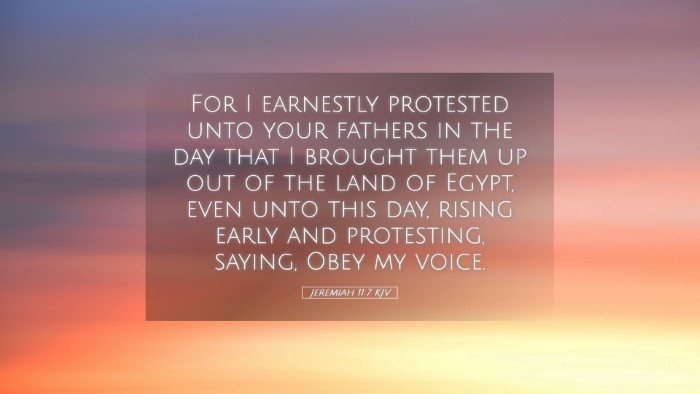Commentary on Jeremiah 11:7
Jeremiah 11:7 states, "For I earnestly protested unto your fathers in the day that I brought them up out of the land of Egypt, even unto this day, rising early and protesting, saying, Obey my voice." This verse underscores the enduring nature of God's call to obedience, a theme pervasive throughout the Scriptures. In this commentary, we draw insights from several public domain commentaries to elucidate the meaning and implications of this verse for contemporary readers.
Context of Jeremiah's Prophecy
Jeremiah's ministry occurred during a tumultuous period in Judah's history, specifically leading up to Babylon's impending conquest. His role was primarily as a prophet who conveyed God's messages, often filled with warnings and calls for repentance. Understanding this context is crucial to grasp the full impact of Jeremiah's words in 11:7.
The Nature of God's Protestations
Both Albert Barnes and Matthew Henry emphasize the heartfelt nature of God's protests to His people. God "protested" with earnestness, indicating His deep concern for the welfare of His people. The use of the term 'protest' signifies not just a mere announcement, but a passionate plea for obedience and righteousness.
God's Early and Persistent Call
In this verse, God mentions that He "rising early" sought to call His people back to Himself. Matthew Henry elaborates on this idea by suggesting that God's persistent appeal reflects His grace and mercy; actively going out of His way to draw His followers, despite their repeated failures. This serves as a profound testament to God's character, showcasing His desire for a relationship even amid rebellion.
The Historical Context of Egypt
Referencing the Israelites' exodus from Egypt, the verse reminds us of the foundational moment of covenant faithfulness. Adam Clarke notes that the Israelites had profound historical experiences of God's deliverance and guidance. This background serves to highlight the folly of forgetting God’s past acts and the covenant made with their ancestors. By recalling their deliverance from Egypt, God invokes the covenant relationship established with the patriarchs.
The Central Command: Obey My Voice
The final phrase of the verse, "Obey my voice," serves as the crux of God's message. The imperative nature of this command addresses the covenant relationship between God and Israel. The expectation that the people listen and adhere to God’s voice is not incidental but fundamental to their identity and survival.
The Consequences of Disobedience
Albert Barnes provides crucial insights on the repercussions of failing to heed God's voice. He stresses that disobedience leads to dire consequences, both spiritually and temporally. God’s repeat protests through His prophets are a call to avert disaster that would come from forsaking His commandments.
Spiritual and Theological Implications
The implications of this verse extend beyond the historical and cultural context of ancient Israel. For pastors, students, and theologians alike, Jeremiah 11:7 serves as a reminder of the unchanging nature of God’s call to His people throughout the ages.
The Call for Contemporary Obedience
In today's context, the verse challenges believers to examine their own lives in light of obedience to God's voice. Matthew Henry notes that individuals are often drawn into professions and practices contrary to the teachings of Scripture. This prompts the question: are we listening earnestly to God's voice amidst the distractions of modern life?
The Role of the Church
The church today is called to echo this message of obedience in a world striving for autonomy. The assurance of God’s faithfulness and the call to obedience should be central themes in pastoral teaching. Like the prophets of old, church leaders must rise early and earnestly to impart the necessity of adhering to the voice of God.
Conclusion
Jeremiah 11:7 serves as a profound reminder of God's tireless efforts to reach out to His people, urging them toward obedience. With insights from Albert Barnes, Matthew Henry, and Adam Clarke, we see that the themes of divine longing, historical context, and the imperative of responding to God's voice are timeless truths. As we reflect on this verse, may we be encouraged to listen attentively and respond faithfully to the God who continually calls us back to Him.


